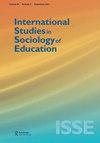情感资本、学生行为与教育不平等
IF 1.5
Q2 EDUCATION & EDUCATIONAL RESEARCH
International Studies in Sociology of Education
Pub Date : 2021-11-07
DOI:10.1080/09620214.2021.1997350
引用次数: 3
摘要
摘要利用2010-11届幼儿园幼儿纵向研究(ECLS-K:2011)的数据,本文提出从理论上重新定义并实证捕捉情感资本的概念,将其应用于学生,包括五个组成部分(参与度、学校归属感、毅力、同伴社会支持和生活满意度)。本研究一方面论证了学生的人口统计学特征与情绪资本之间的关系,另一方面也论证了情绪资本与学生行为之间的关系。我们发现,社会经济地位较高的学生和女孩拥有更高水平的情感资本。更强的参与感和学校归属感与减少内化和外化行为问题以及改进学习方法有关。Grit和同伴社会支持与减少内化行为问题和改进学习方法有关。生活满意度越高,外化行为问题越少。我们讨论了这些发现对教育政策和实践的影响。本文章由计算机程序翻译,如有差异,请以英文原文为准。
Emotional capital, student’s behavior and educational inequality
ABSTRACT Using the data from the Early Childhood Longitudinal Study, Kindergarten Class of 2010–11 (ECLS-K:2011), this paper proposes to theoretically redefine and empirically capture the concept of emotional capital as it applies to students, employing five components (engagement, school belonging, grit, peer social support, and life satisfaction). The study demonstrates the associations between students’ demographic characteristics and emotional capital on one hand, and the relationships between emotional capital and student behavior, on the other. We found that higher SES students and girls possessed higher levels of emotional capital. Stronger feelings of engagement and school belonging were associated with reduced internalizing and externalizing behavior problems, and improved approaches to learning. Grit and peer social support were associated with reduced internalizing behavior problems and improved approaches to learning. Higher level of life satisfaction was associated with reduced externalizing behavior problems. We discuss the implications of these findings to educational policy and practice.
求助全文
通过发布文献求助,成功后即可免费获取论文全文。
去求助
来源期刊
CiteScore
3.40
自引率
7.70%
发文量
34
期刊介绍:
International Studies in Sociology of Education is an international journal and publishes papers in the sociology of education which critically engage with theoretical and empirical issues, drawn from as wide a range of perspectives as possible. It aims to move debates forward. The journal is international in outlook and readership and receives papers from around the world. The journal publishes four issues a year; the first three are devoted to a particular theme while the fourth is an "open" issue.

 求助内容:
求助内容: 应助结果提醒方式:
应助结果提醒方式:


